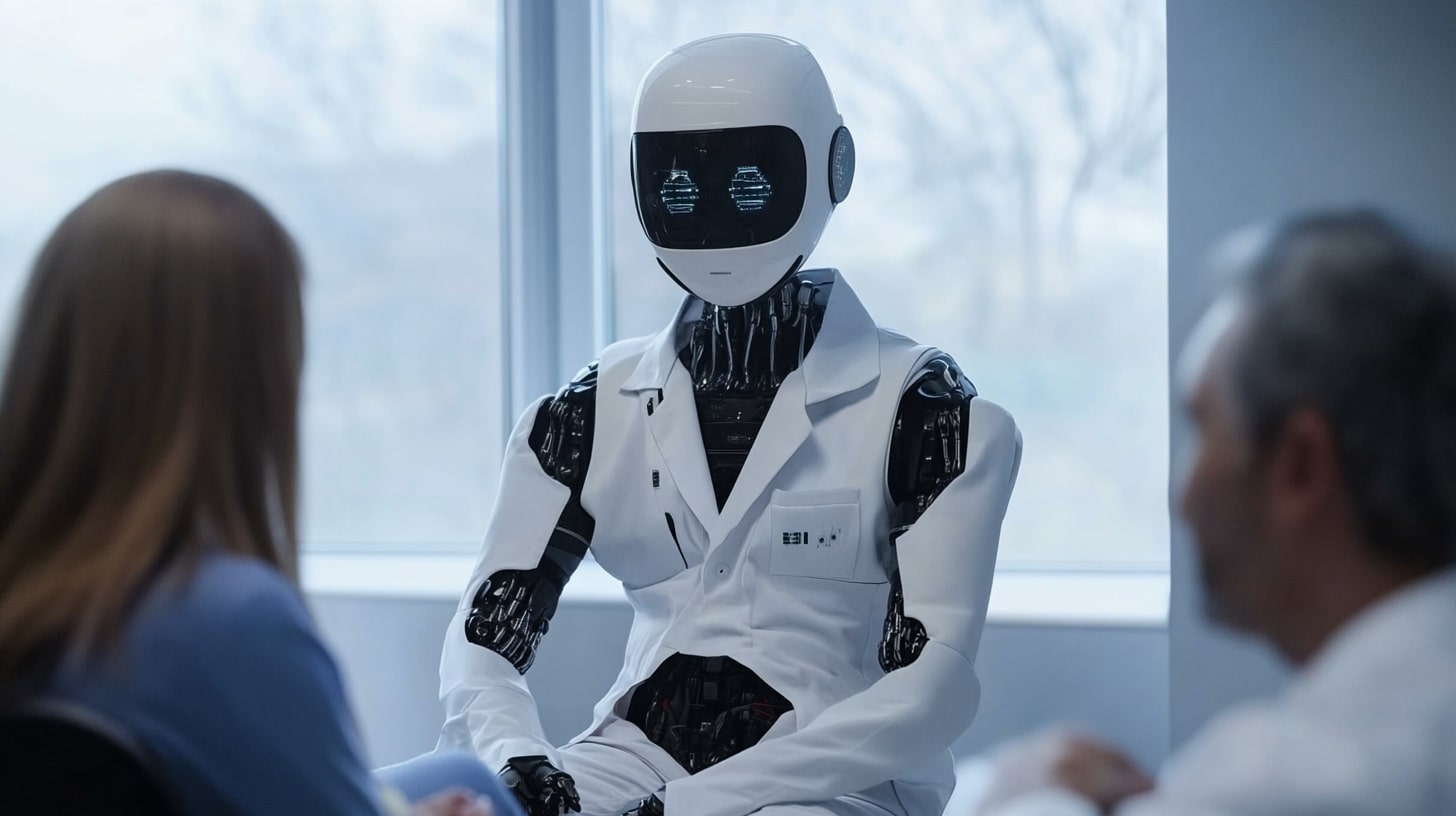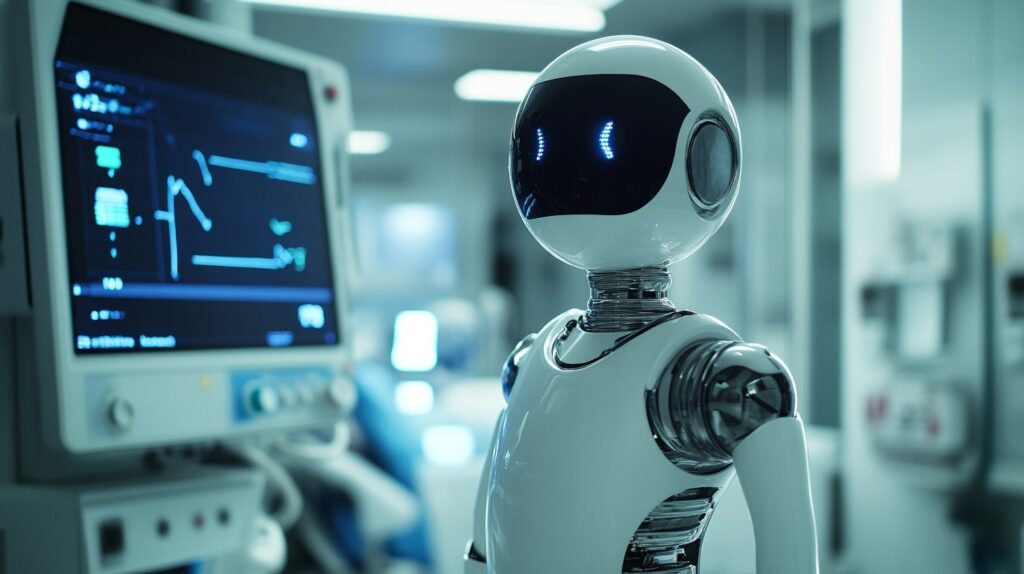Virtual Health Assistants: How AI Is Transforming Healthcare Support

The rapid development of artificial intelligence (AI) is already changing medicine today. This offers incredible advantages in disease diagnostics, therapy, and medical research. We will take a closer look at the role of virtual health assistants in healthcare. Let's explore how AI technologies are reshaping the future of the healthcare industry. We will also discuss what prospects they open up. AI technologies are now widely implemented across the healthcare sector. These include computer vision mechanisms for analyzing medical images. AI also affects machine and deep learning tools for processing Big Data. This has improved algorithms for genetic and epidemiological research. Tools for developing new drugs have made a worldwide splash.
Today, the healthcare sector has become one of the leading adopters of AI technology. It has become essential for the practical implementation of AI technologies. Machine learning algorithms open up opportunities for automating complex analytical tasks. It is vital in medicine and pharmaceuticals. AI-powered virtual assistants have become especially valuable. They are particularly valuable given the chronic shortage of resources and specialists that the industry faces. Digital health assistants are leading the way toward the future of healthcare.
What Are Virtual Health Assistants and How Do They Work?
An AI-powered health assistant is a digital tool designed to support healthcare tasks. It uses AI to streamline patient care and administrative duties. Unlike human-supported virtual services, AI-based virtual healthcare assistants operate autonomously. They leverage algorithms to process data and respond instantly. Human services, in contrast, rely on live staff for tasks. They enhance care, but AI offers 24/7 availability and scalability. How does a virtual health assistant in healthcare function? Let's explore:
- Patient Communication: A virtual health assistant answers queries via chat or voice. It provides info on treatments or clinic hours.
- Symptom Checking: The virtual health assistant assesses symptoms using AI models. It suggests next steps, like seeing a doctor.
- Record Management: A virtual healthcare assistant organizes patient data securely. It updates records and shares them with providers.
- Appointment Scheduling: The virtual health aid books visits and sends reminders. It reduces no-shows and saves time.
- Medication Reminders: A personal health assistant tracks prescriptions. It alerts patients to take their meds on schedule.
- Health Education: The virtual healthcare aid shares tips on wellness. It tailors advice to individual needs.
These functions make virtual health assistants indispensable in modern healthcare. They streamline operations and boost efficiency for providers. AI helpers automate scheduling, billing, and patient queries. For individuals, a virtual care agent enhances accessibility. They offer instant support and reduce wait times. It is especially crucial in underserved areas. By managing routine tasks, an AI-powered healthcare assistant frees up staff so they can focus on critical care and improve outcomes. Whether AI-driven or human-supported, these tools transform healthcare delivery. They make it more equitable and patient-centered across clinics and hospitals.
AI-Powered Assistants in Clinical and Administrative Roles
AI-driven virtual health assistants are revolutionizing how hospitals and clinics operate. They automate and optimize routine processes. These intelligent systems handle essential tasks. These include patient triage, clinical documentation, and appointment scheduling. Virtual health assistants post-visit follow-ups with speed and accuracy. An AI healthcare agent significantly boosts operational efficiency. It reduces the administrative burden on staff. AI helpers allow medical professionals to devote more time to delivering hands-on patient care. Their integration leads to smoother workflows, improved patient satisfaction, and better resource management. Below is a table highlighting their key roles and benefits:
| Role | Description |
| Triage Support | An AI agent in healthcare assesses patient symptoms quickly. It prioritizes cases and guides patients to appropriate care. |
| Documentation | A virtual health assistant records visit details automatically. It updates electronic health records, reducing manual errors. |
| Patient Follow-Ups | Virtual nursing aids send reminders for meds or appointments. They check recovery progress via automated chats or calls. |
| Care Coordination | An AI healthcare agent shares updates between providers. It ensures seamless communication for treatment plans. |
These virtual health aids significantly save time and enhance accuracy across medical settings. An AI virtual assistant in healthcare efficiently manages repetitive administrative tasks. They are scheduling, documenting, and performing data entry. It dramatically reduces operational costs. Virtual nursing assistants go a step further by increasing patient engagement. This is achieved through timely reminders, follow-ups, and real-time monitoring. These AI solutions seamlessly integrate into existing healthcare workflows. They help streamline processes. These AI tools also improve patient outcomes. AI agents make modern healthcare systems more innovative and efficient. They also become highly responsive to individual patient needs.
Human-Supported Virtual Assistants in Healthcare
Human-supported virtual assistants are vital in healthcare. They offer personalized support for telehealth, follow-ups, and non-critical tasks. Operating remotely, a remote healthcare assistant bridges gaps between patients and providers. Unlike AI systems, these assistants bring empathy and human judgment to their work. A home-based medical virtual assistant handles routine duties. It ensures seamless care delivery. Here’s how they contribute:
- Telehealth Support: A healthcare virtual agent facilitates virtual consultations. They guide patients through video call setups and troubleshoot issues.
- Patient Follow-Ups: A virtual nursing assistant checks on patients post-visit. They confirm medication adherence or schedule follow-up appointments.
- Appointment Coordination: A home-based medical agent who books and manages appointments. They send reminders to reduce missed visits.
- Non-Critical Task Handling: A remote virtual assistant processes insurance forms or updates records. This frees up the onsite staff for urgent care.
- Emotional Support: A home-based healthcare helper offers compassionate listening. They comfort patients anxious about health concerns.
- Patient Education: A virtual assistant nurse explains treatment plans in simple terms. They answer questions to boost patient understanding.
- Prescription Coordination: A home-based medical agent liaises with pharmacies. They ensure timely refills and clarify dosage instructions.
- Remote Monitoring Assistance: A virtual nursing assistant reviews data from wearable devices. They alert doctors to concerning trends while reassuring patients.
These assistants enhance healthcare by combining human warmth with remote efficiency. A home-based healthcare AI agent reduces clinic workloads. It lets doctors focus on complex cases. For patients, a medical virtual helper provides accessible support, especially in rural areas. A virtual health assistant nurse adds clinical expertise. It ensures thorough and caring follow-ups. Operating from home, they offer flexible, cost-effective services without sacrificing quality. Handling non-critical tasks makes telehealth smoother and more personal. It strengthens patient-provider connections.
Key Use Cases and Benefits of Virtual Healthcare Assistants

Virtual assistants are revolutionizing healthcare. They streamline operations and enhance patient care. Studies show 70% of healthcare providers now use some form of AI assistance. They also have adoption growing rapidly. These tools deliver measurable benefits across key areas:
- Reducing Administrative Burden: A virtual care aid automates tasks like scheduling and billing. This cuts staff workload by up to 30%, per industry reports, freeing time for patient care.
- Personalizing Patient Experiences: A virtual care aid tailors health advice using patient data. According to recent trends, it sends customized reminders, boosting medication adherence by 20%.
- Improving Access to Care: Virtual nursing assistants AI offer 24/7 support. They answer queries and triage symptoms, helping rural patients access care without travel.
- Lowering Costs: AI nursing assistants reduce clinic overhead costs. Automation of routine tasks can save hospitals millions annually. Some report 15% cost reductions.
- Supporting Telehealth: AI-powered nursing assistants streamline virtual visits. They ensure seamless communication. These virtual assistants have increased telehealth usage by 40% in recent years.
- Enhancing Follow-Ups: A virtual care assistant tracks recovery via automated check-ins. This improves outcomes, with 80% of patients preferring digital follow-ups for convenience.
Virtual assistants handle time-consuming and repetitive administrative tasks. They are responsible for appointment scheduling, billing, and data entry. Virtual assistants free up healthcare providers. This allows them to concentrate on more complex and high-value aspects of patient care. Their ability to scale across departments and facilities makes them a highly efficient solution. These virtual assistants help with a wide range of clinical and operational needs. This improves the overall patient experience. Such assistants drive measurable improvements in outcomes and operational efficiency. As a result, they are becoming indispensable tools. It delivers significant cost savings across the entire healthcare industry.
Virtual Assistants in Chronic Condition Management
Virtual assistants in healthcare are vital in managing chronic conditions. These AI-driven helpers empower patients with tools for monitoring, adherence, and consistent care. They are especially valuable in home care. AI agents offer long-term support for conditions like diabetes, hypertension, and heart disease. Integrating with devices and health records ensures proactive management. Here’s how they help:
- Continuous Monitoring: Virtual health agents track vital signs via connected devices. These include glucose meters or blood pressure cuffs. They alert patients and doctors to anomalies, reducing the risks of complications.
- Medication Adherence: AI-powered health assistants send timely reminders for medications. They confirm doses are taken properly and educate patients on side effects. According to recent studies, AI helpers are improving compliance rates by up to 25%.
- Regular Health Check-Ins: Virtual health assistants conduct automated surveys or calls. They assess symptoms and mood, detecting worsening heart failure early.
- Personalized Health Plans: AI-powered health assistants analyze patient data. This allows them to tailor diet or exercise advice. For example, they suggest low-sodium meals for hypertension patients, enhancing outcomes. AI-powered health assistants manage wound care schedules and guide caregivers with task reminders. They reduce hospital visits by enabling effective home management.
- Data Sharing with Providers: Virtual assistants in healthcare sync updates. It lets them access electronic health records. Doctors receive real-time insights. They allow them to make timely adjustments to treatment plans.
- Emotional Support: Virtual health agents engage patients with motivational messages. For chronic pain patients, this boosts mental resilience, critical for long-term wellness.
- Emergency Alerts: AI agents in healthcare detect critical changes, like irregular heart rhythms. They notify emergency contacts, ensuring rapid response.
Virtual health assistants reduce the burden on families and clinicians. They offer 24/7 monitoring, catching issues early. For long-term support, their scalability ensures consistent care without straining resources. Virtual helpers in healthcare foster adherence and engagement. They improve the quality of life for millions managing chronic conditions.
Virtual Assistants for Mental Health and Wellness
Virtual health assistants are transforming mental health support. Conversational AI, like a virtual assistant in healthcare, offers accessible, non-emergency guidance. These tools help with stress, anxiety, and wellness coaching. They provide 24/7 support, filling gaps where traditional therapy may be 100% limited. Mental health issues affect over 20% of adults globally. Virtual health agents are increasingly vital. They empower users to manage their well-being at home. Here’s how they contribute:
- Conversational Support: Virtual health assistants engage in empathetic chats. They listen to concerns and offer coping strategies for stress or low mood.
- Stress Tracking: An AI agent monitors stress via user inputs or wearable data. It suggests breathing exercises or mindfulness when stress spikes.
- Behavioral Coaching: Virtual health assistants guide users toward healthier habits. They set sleep, exercise, or journaling goals to improve mental resilience.
- Mood Monitoring: An AI helper in healthcare tracks emotional patterns. They do it through daily check-ins. It flags persistent low moods for professional follow-up.
- Mindfulness Guidance: Digital health helpers lead meditation or relaxation sessions. They provide audio or text prompts to reduce anxiety on demand.
- Resource Sharing: An AI agent in healthcare connects users to articles or videos. It curates mental health content tailored to individual needs.
- Non-Emergency Support: Virtual nursing assistants handle routine concerns like insomnia or motivation. They refer emergencies to professionals, ensuring safe care boundaries.
These tools don’t replace therapists but complement them. Virtual health assistants offer instant and stigma-free support. It is especially pivotal for those hesitant to seek help. An AI virtual assistant expands access, with studies showing 60% of users feel less isolated when using AI tools. By fostering proactive wellness, they’re reshaping mental health care for millions.
Challenges and Ethical Considerations in Virtual Healthcare

The rise of digital agents in healthcare brings promise but also challenges. The virtual care assistant streamlines care, yet ethical concerns demand attention. Data privacy and AI limitations require careful navigation. Human oversight remains critical in sensitive health matters. Here are the key challenges:
- Data Privacy: A virtual assistant in healthcare handles sensitive patient data. Unauthorized access or breaches risk personal information. It necessitates robust encryption and compliance with laws like HIPAA.
- Patient Consent: A virtual care helper must ensure explicit consent for data use. Patients must understand how their information is processed, stored, and shared.
- AI Decision-Making Limitations: A robotic aid in healthcare may misinterpret complex symptoms. It lacks human intuition, making errors possible in nuanced cases. This is especially true for mental health or rare conditions.
- Trust in AI: Building trust with a home-based healthcare virtual assistant is vital. Missteps in communication or incorrect advice can erode confidence. This requires transparency about AI capabilities.
- Bias in Algorithms: A virtual care aid can inherit biases from training data. This may lead to misdiagnosis of specific demographics. It demands regular algorithm audits.
- Over-Reliance on Technology: A home-based medical helper risks reducing human interaction. Patients may feel isolated if AI replaces empathetic care. This highlights the need for balanced integration of technology.
- Human Oversight Needs: Virtual assistants cannot replace doctors in critical decisions. Oversight ensures AI supports, not dictates, care plans. It is especially important for emergencies or complex diagnoses.
Addressing these challenges strengthens the role of the virtual care assistant. Transparent policies, rigorous testing, and human supervision are pivotal. They ensure that a home-based healthcare AI agent serves patients safely. By balancing innovation with ethics, they can deliver equitable and trustworthy support. AI medical helpers respect patient rights and dignity.
The Future of Healthcare with Virtual Assistants
The future of healthcare shines bright with virtual nursing agents. These tools are poised to revolutionize care delivery. They offer smarter and more accessible solutions. From advanced diagnostics to seamless integrations, their potential is vast. As technology evolves, they’ll reshape patient experiences globally. Here’s what lies ahead:
- Smarter Diagnostics: Virtual nursing assistants' AI will analyze symptoms more accurately. Enhanced algorithms will detect patterns in data. They aid in the early diagnosis of cancer or diabetes.
- Multilingual Support: A health care virtual health assistant will communicate in multiple languages. This breaks barriers, ensuring non-English speakers access care effortlessly, especially in diverse regions.
- Telemedicine Integration: Virtual nursing aids will streamline virtual consultations. They’ll prep patients, share records, and follow up. It makes telehealth smoother and more efficient.
- Cost Efficiency: A health care virtual assistant will cut operational costs. Automation of routine tasks will save hospitals billions. It makes quality care more affordable.
- EHR System Syncing: AI assistants will be fully integrated with EHR systems. Real-time updates will ensure providers access accurate data, reducing errors and delays.
- Personalized Care Plans: Virtual nursing helpers will tailor health advice. They'll do this by using patient history. They’ll suggest diets, exercises, or meds customized to individual needs, boosting outcomes.
- 24/7 Chronic Care: A virtual nursing assistant's AI monitors such conditions continuously. Wearable data will trigger alerts for irregularities. It prevents complications in real time.
- Mental Health Expansion: AI-powered nursing assistants will offer advanced emotional support. Conversational AI will guide mindfulness or therapy exercises, addressing rising mental health demands.
Virtual nursing helpers are rapidly evolving. They’ll empower patients and providers. Seamless integration with telemedicine and EHRs will create a connected, efficient healthcare ecosystem. The future promises equitable medical care. This advancement is driven by innovation and improved accessibility. Contact us to learn more about our solutions in this growing field.


